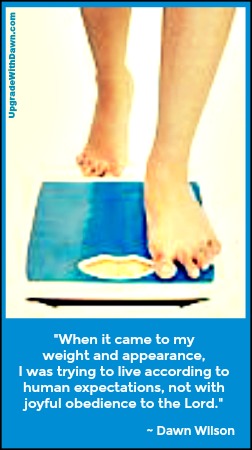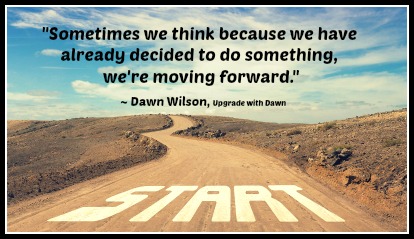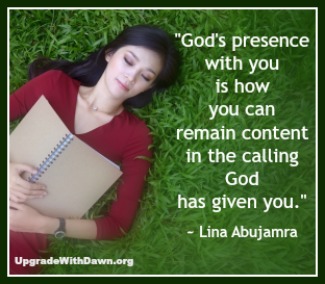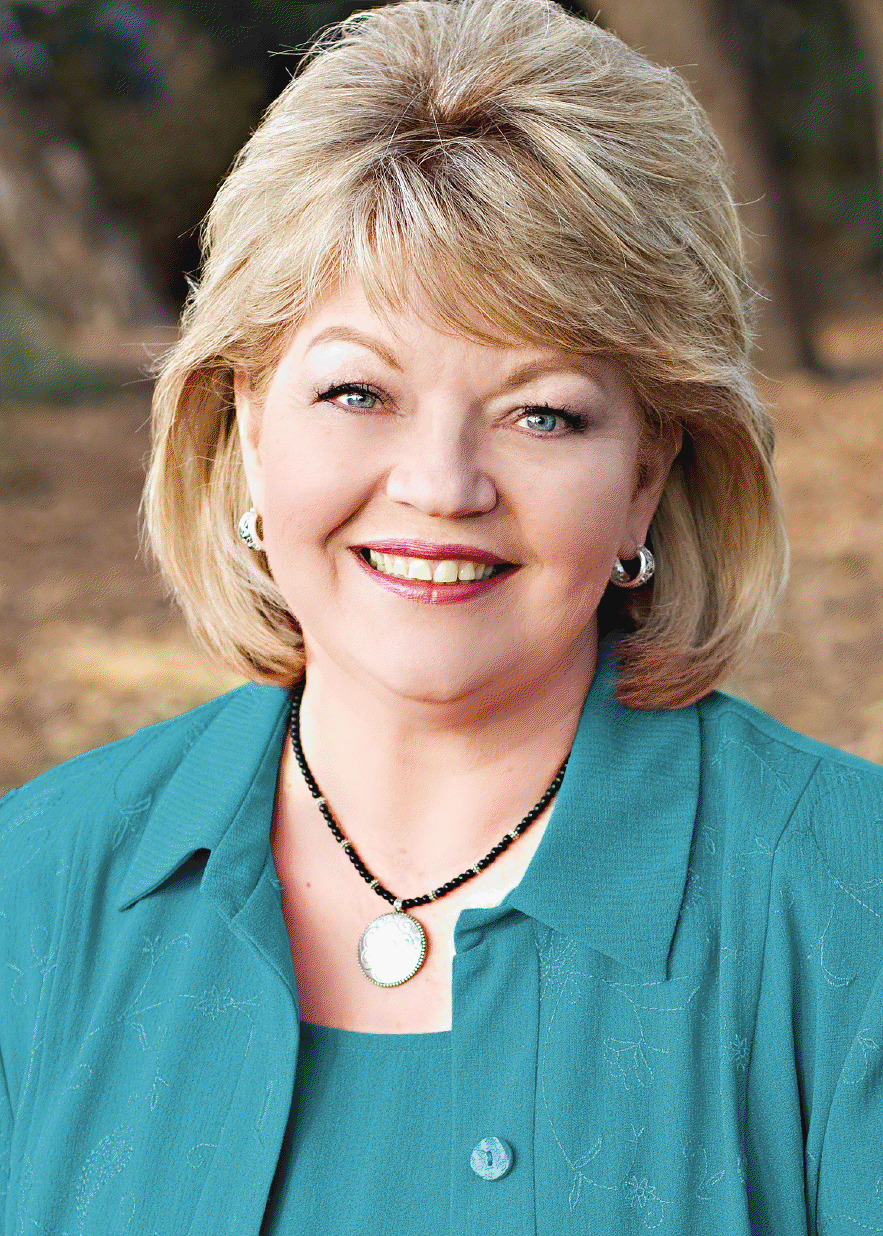Obedience ... and My Bathroom Scale
Dawn Wilson discovered a simple concept that changed her health overhaul, but it had far deeper  consequences. In this Health and Spiritual Life UPGRADE, she focuses in on a key life-changer: Obedience.
consequences. In this Health and Spiritual Life UPGRADE, she focuses in on a key life-changer: Obedience.
I stepped off the bathroom scale one morning with disgust. Hadn't I stayed "on program," following my nutritionist's counsel carefully? (Maybe I deviated a wee bit... OK, twice.)
But really, the scale should have budged a little over a week. I was eating healthier and exercising more than a year before.
What happened?
Now I knew, from my nutritionist's cautions, that many things can influence the scale: gaining muscle from exercise as we lose fat, overeating, emotional eating, the time of the month, and even being constipated!
So I shouldn't worry. I knew I should just stay the course and over time, I'd see change.
But I was still mad that morning.
I started questioning the whole process. I grumbled. I was ready to throw in the towel, or maybe toss out my scale!
But wouldn't you know it. God was watching.
And the Lord provided an answer for me that very morning.
It came from Lysa TerKeurst. She quoted a friend who said,
"Define your week by obedience, not by a number on the scale."
I tell you, I cried as I read those words.
When it came to my weight and appearance, I was trying to live according to human expectations, not with joyful obedience to the Lord.
Lysa continued, again quoting her friend:
"Yes, eating healthy and exercising get our bodies into better shape, but we are never supposed to get soul satisfaction from our looks. Our looks are temporary ... The apostle Paul wrote, 'We must obey God rather than human beings' (Acts 5:29).
"I read that verse differently now. 'I must obey God rather than human values'—like a number on the scale or the size on the tag in my jeans."
I wanted to solidify that thought in my mind, and my study on obedience that day encouraged my heart. I simply asked:
Why do we obey the Lord? (Or maybe, why should we?) And here's what I discovered:
1. We obey the Lord because He IS Lord!
Obedience is the right thing to do, because He is our Lord, our Master, and He has every right to tell us what to do. He rightly expects obedience. He says, "Be holy, for I am holy" (1 Peter 1:16), and "love each other as I have loved you" (John 13:34). Commands like that.
In the Old Testament, God required obedience regarding particular laws. He told his people, "keep my commandments and do them" (Leviticus 22:31). In other words, put them into practice!
Why? "... I am the LORD."
God also connected obedience to His sovereignty and His rescuing of Israel from Egypt (v. 33). Their obedience was a humble response to their gracious Lord's deliverance.
Likewise, we must respond to His Lordship and holiness from grateful hearts, because He has "delivered" (rescued) us from sin and spiritual darkness (Galatians 1:4; Colossians 1:13-14). We glady offer ourselves to Him as living "sacrifices" (Romans 12:1-2) to do His bidding.
What we want (desire, crave) is always to take second place to what He wants.
This is so crucial. In fact, our desire to obey the Lord is one sign to others that we know Him (1 John 2:3).
We are to obey the Lord IMMEDIATELY, COMPLETELY and JOYFULLY (Psalm 119:60; 1 Chronicles 28:8; Psalm 112:1).
2. Obedience demonstrates love for the Lord (1 John 5:2-3).
If we love Him, we will desire to keep His commands (John 14:15, 23).
It's not a matter of obedience to a plan, program, any list of arbitrary rules or people's preferences for our lives, but rather: "What is the Lord teaching me through the things He brings into my life and the disciplines He wants me to cultivate?"
If I love the Lord, I will seek to obey Him as I'm prompted by the Spirit of God (Galatians 5:16; John 14:26). It is the Spirit who gives us necessary wisdom and empowers us to obey (1 Corinthians 2:9-13, 16; Zechariah 4:6). It is the Spirit who helps us in our weakness and intercedes for us when we struggle with obedience (Romans 8:26-27).
3. Our obedience in faith pleases the Lord (Hebrews 11:6).
It's about our hearts. God sees our hearts and delights in us when we obey (1 Samuel 15:22).
We can be such disobedient creatures—willful and independent of God. Disobedience can indicate a heart filled with fear, lack of faith, wrong desires, personal agendas or even idolatries.
The Lord showed me a deep idolatry I cherished: the idol of food. Food is good and nourishing, but giving in to my rebellious appetite controls and enslaves. Constant cravings and lack of discipline point to a tremendous heart issue. My false god will never satisfy the deep needs in my heart. I need to give my food idol to the Lord and worship Him alone—not fudge and French fries!
It takes faith to obey the Lord when we can't see the end results. But when we choose to "trust and obey," this pleases Him.
4. Obedience is one way to prove our faithfulness to the Lord (1 John 2:3-6).
God does not respond to our mere discussions about obedience, but rather to our active obedience (James 1:22-25).
He evaluates our behavior for signs of faithfulness. He checks to see what values are driving our actions. He looks for intergrity.
In the Old Tesament, God said he would "raise up a faithful priest" who would serve Him and "do whatever I tell him to do" (1 Samuel 2:35). Likewise, God is looking for faithful servants today. It's ESSENTIAL.
5. Obedience opens the door for the Lord to bless and reward (John 13:17).
As the old hymn says, "Trust and obey, for there's no other way to be happy in Jesus, but to trust and obey." Obedience may be difficult at times, but it ultimately brings joy, freedom and fulfillment (Psalm 119:1-2).
"Blessed (HAPPY) are all who ... walk in obedience" (Psalm 128:1).
Throughout the history of God's people in the Old Testament, the Lord promised reward and many blessings to those who obeyed Him and His Word (Genesis 22:18; Deuteronomy 4:39-40; 5:29; Proverbs 3:1-6; Jeremiah 7:23-24). Truly, in keeping (embracing and obeying) God's Word, there is great reward (Psalm 19:11).
Jesus echoed this truth. If we obey His commands, He said, we will be blessed to dwell in His love and find joy that is complete (John 15:10-11).
Some of the rewards of obedience are long life, gladness, protection, a sense of God's presence, assurance, peace; and answers to prayer. (Scriptures for these are at the end of this post.)
God rewards those who seek Him with a heart bent to obey.
6. Obedience glorifies God in our lives and before others (Matthew 5:16).
We should never want to bring shame on God's holy name; we should deeply desire to bring him honor and glory.
Our testimony of obedience to our loving Father shows the world God is working in and through us (1 Peter 2:12); and the sweet blessing is, God honors those who honor Him (1 Samuel 2:30b).
In these terms, living according to human expectations or values cannot be compared to living in obedience to God. Obedience is a far superior way to live, and with eternal dividends.
And it might even nudge that bathroom scale!
How can you apply these points of obedience to something practical in your life—regaining your health, getting out of debt, working on a relationship or something else?
Dawn Wilson, founder and President of Heart Choices Today, is a speaker and author, and the  creator of three blogs: Heart Choices Today, LOL with God (with Pam Farrel), and Upgrade with Dawn. She is a contracted researcher/reviewer for Revive Our Hearts and a writer at Crosswalk.com. She and her husband Bob live in Southern California and have two grown, married sons, three granddaughters and a rascally maltipoo, Roscoe.
creator of three blogs: Heart Choices Today, LOL with God (with Pam Farrel), and Upgrade with Dawn. She is a contracted researcher/reviewer for Revive Our Hearts and a writer at Crosswalk.com. She and her husband Bob live in Southern California and have two grown, married sons, three granddaughters and a rascally maltipoo, Roscoe.
Scriptures for "rewards" of obedience: long life (Deuteronomy 32:46-47; Proverbs 3:1-2); gladness (Nehemiah 8:17; 1 Chronicles 16:27; Acts 2:41, 46); protection (Deuteronomy 23:5); a sense of God's presence (John 14:21); assurance (1 John 3:24); peace (Psalm 119:165); and answers to prayer (1 John 3:22).
Graphic adapted, courtesy of HyenaReality, FreeDigitalPhotos.net.
 Post a Comment → Posted on
Post a Comment → Posted on  Thursday, March 30, 2017 at 8:37AM
Thursday, March 30, 2017 at 8:37AM  God blesses obedience,
God blesses obedience,  God rewards obedience,
God rewards obedience,  He is Lord,
He is Lord,  Lysa TerKeurst,
Lysa TerKeurst,  Obedience,
Obedience,  Obedience demonstrates faithfulness,
Obedience demonstrates faithfulness,  Obedience demonstrates love,
Obedience demonstrates love,  Obedience pleases God,
Obedience pleases God,  Obey God rather than men,
Obey God rather than men,  Obeying God,
Obeying God,  Weight loss and the Christian,
Weight loss and the Christian,  weight Upgrade Your Life
weight Upgrade Your Life  Health,
Health,  Relationship with God
Relationship with God 














